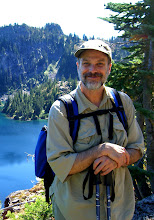Wednesday, February 29, 2012
Skandhas
Experience is comprised of five groups (skandhas) of experience: sensations, feelings, thoughts and emotions, impulses, and consciousness. The sense of self is a projection of continuity and independence onto experiences which are actually impermanent and dependent, arising and disappearing depending on causes and conditions.
The reactive emotions that lead to suffering are part the self’s habitual emotional and behavioral attempts to cling to pleasant experiences, push away threatening experiences, and ignore neutral experiences.
Attachment, aversion, and ignoring are the traditional three poisons that push the cycle of reactivity. Reactive patterns, since they are based on false projections of independence, permanence, and control, never deliver the satisfaction they seek.
Fully experiencing sensations, feelings, emotions and thoughts, and impulses in attention, knowing them to be experiences and not facts, breaks the cycle of reactivity, and gradually dispels the confusion and projections that result in cycles of suffering.
~ for a graphic depiction of the five skandhas, click here
.
Eyes
Could a greater miracle take place than for us to look through each other's eyes for an instant?
~ Henry David Thoreau, Walden
Sunday, February 26, 2012
To Ease the Pain
Well, while I'm here I'll do the work --
and what's the work?
To ease the pain of living.
Everything else,
drunken dumbshow.
~Allen Ginsberg
Thursday, February 23, 2012
The Essence
Everything changes
Struggle and suffering arise
The essence of what ends suffering: compassion and awareness
Awareness: knowing what is arising
Compassion: feeling and caring
.
Friday, February 17, 2012
You Can't Win & You Can't Lose
"Then the path of peace depends on being patient with the fact that all of us make mistakes. And that’s more important than getting it right. This whole process seems to work only if you’re willing to give yourself a break, to soften up, as you practice patience. As with the rest of the teachings, you can’t win and you can’t lose. You don’t get to just say, “Well, since I never can do it, I’m not going to try.” It’s like you never can do it and still you try. And, interestingly enough, that adds up to something, it adds up to appreciation for yourself and for others. It adds up to there being more warmth in the world. You look out through your eyes and you just see yourself wherever you go -- you see all these people who are escalating their suffering just like you do. You also notice people catching themselves just like you do, and they give you the gift of their fearlessness. You begin to be grateful for even the slightest gesture of bravery on the part of others because you know it’s not so easy. Their courage increases your trust in the basic goodness of yourself and all beings throughout the world -- each of us just wanting to be happy, each of us not wanting to suffer."
~ Pema Chodron, Practicing Peace in Times of War, p. 53-54
.
Thursday, February 16, 2012
Come Back
Will you seek afar off? you surely come back at last,
In things best known to you finding the best,
or as good as the best,
In folks nearest to you finding the sweetest, strongest, lovingest,
Happiness, knowledge, not in another place but this place,
not for another hour but this hour...
~ Walt Whitman, A Song for Occupations
Monday, February 6, 2012
Calm and Clarity
"Because by cultivating concentration and inquiry together, you are then going to develop creative awareness and creative engagement. And that’s why personally I don’t worry so much about the exact technique because I am more interested in them developing samatha and vipassana, whatever way it is. Because what I think is important is to develop the calm and the clarity.
"But I believe that the way concentration works is actually by returning, not by staying with the thing all the time. So that each time you return you’re not feeding your habit, and you dissolve [its] power. And that’s what will create some spaciousness. And then with the questioning what I believe is that by cultivating the questioning, you’re dissolving the tendency we have to permanentize, by becoming more aware of change."
Subscribe to:
Posts (Atom)

